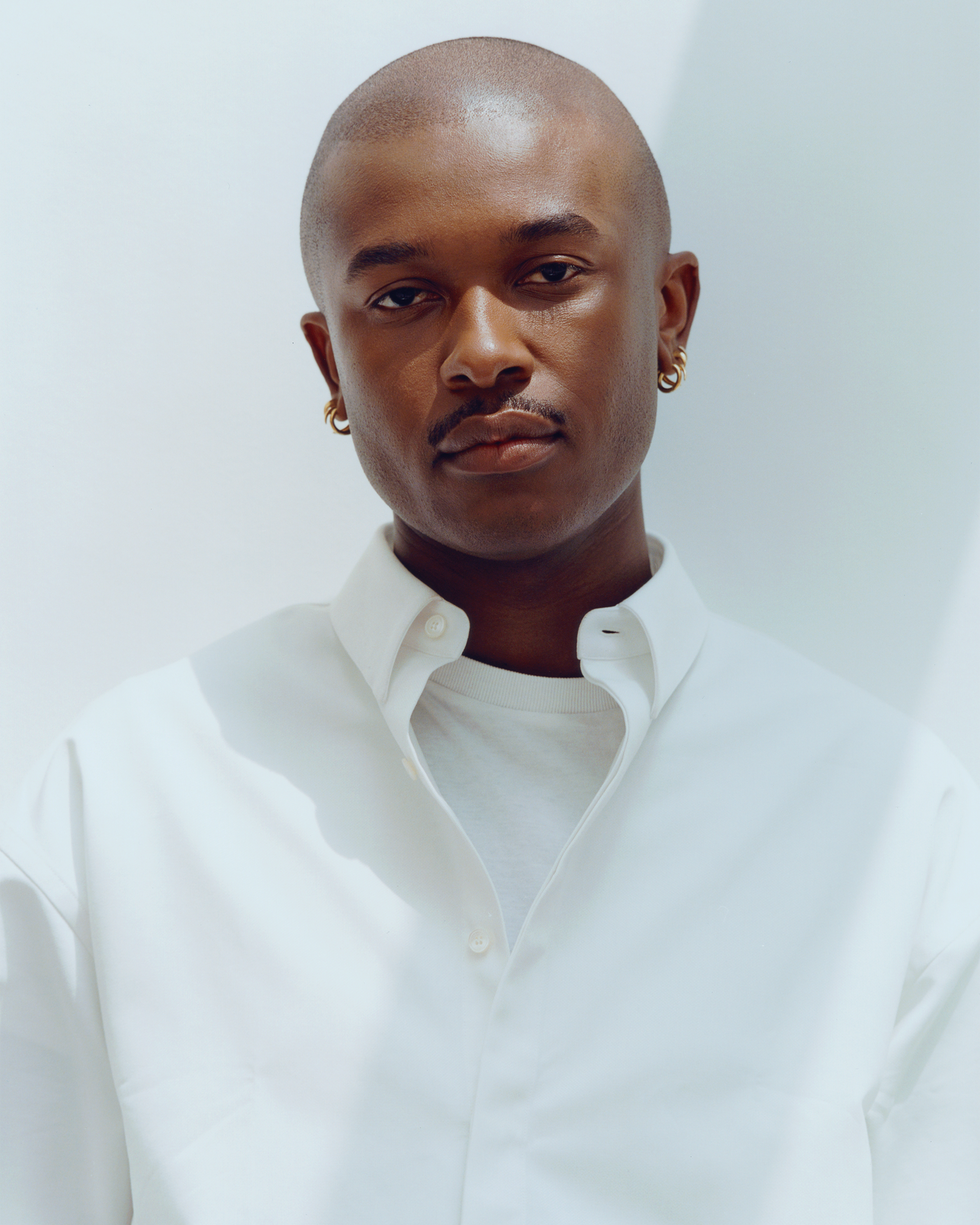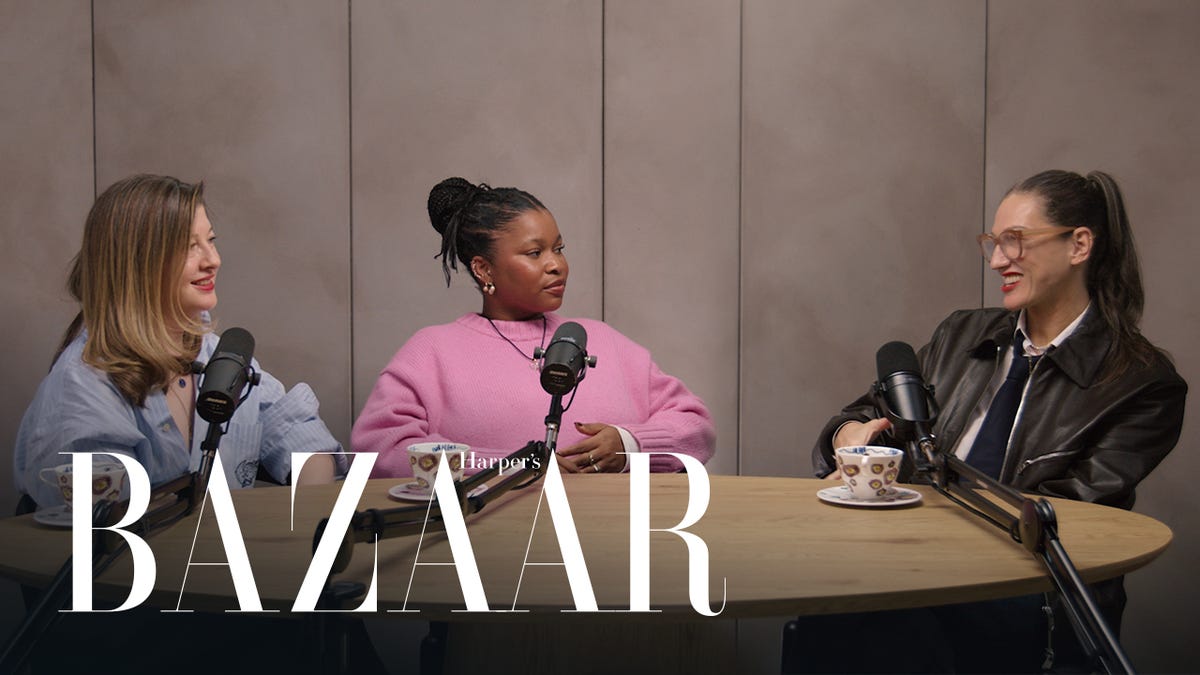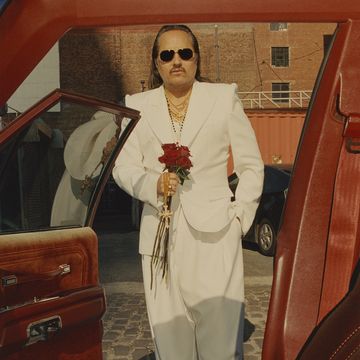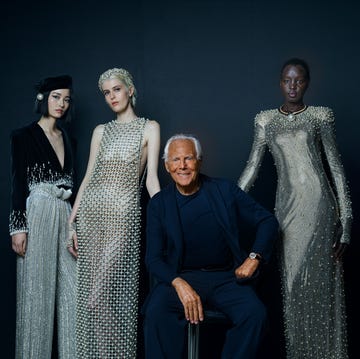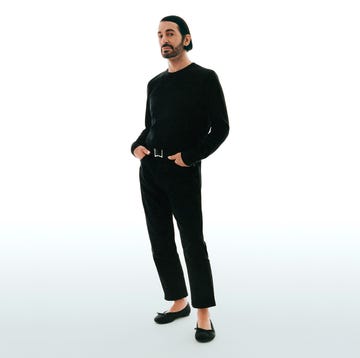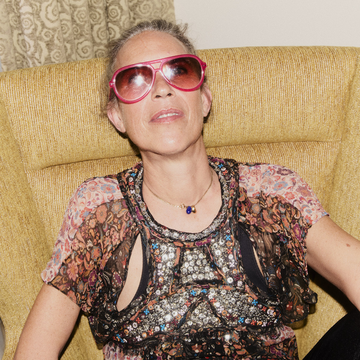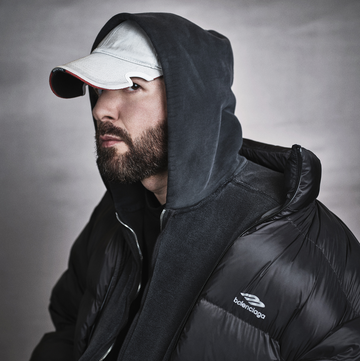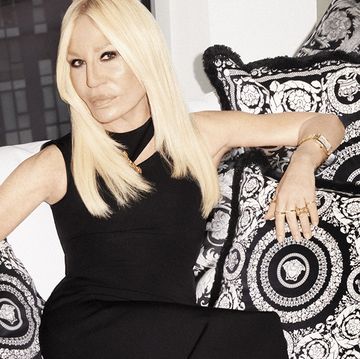Maximilian Davis was in a music video. I learned this while talking to the singer Kelela, a friend of his, about the period when they first met several years ago outside of an East London club night called PDA, a gathering place for kids from fashion and art school looking to let loose in a sea of their own.
It was 2017, and at the time, Davis—who is now creative director at Ferragamo—was one of those kids. He had just graduated from the London College of Fashion and had a job as a junior designer with Grace Wales Bonner, whom he’d gotten to know while they both worked at Selfridges department store. He’d moved to London four years earlier from Manchester, where he grew up in a close-knit family with Trinidadian and Jamaican roots. Fashion played a big role in his life early on: His mother had been a model, his father and one of his older sisters had studied fashion design, and his grandmother taught him to sew. The video in question was for Kelela’s song “LMK” and was set in a trippy club. “It was a party theme,” Kelela explains.
It took me two watches to catch Davis at the 1:33 mark. There he is off to Kelela’s right, dressed in a black tank and a cropped yellow leather jacket tie-dyed like a heat map. He’s leaning against a wall illuminated with neon lights. With its arched ceiling and insulated walls, the room they’re in looks more like a spaceship than a club, but Davis appears right at home.
“When I was younger and I moved to London, I was really into clubbing and I really enjoyed music as a sense of freedom,” Davis tells me on a call from Ferragamo’s headquarters in Florence, Italy. “Clubbing really got people together. It was where we would experience music and feel music, but it was also an area where we could see how people were dressing and what the trends were. That was a starting point for me. That is how I really started to create my team of people around me—just from going out.”
It’s that kind of kinetic, communal energy that Davis, now 28, has brought to Ferragamo. Since his appointment last year, he has injected a new vitality into the 96-year-old house, known primarily for its shoes and leather goods, by drawing upon his love of tailoring as well as his own background, incorporating the mix of freedom and formality he found in the London club scene and the Caribbean customs and cultural traditions that surrounded him as a child.
Davis’s Ferragamo feels at once fresh and familiar—tantalizing enough to court new customers, but refined enough to keep the long-standing fans coming back. For his first collection, Spring 2023, he showed a deep-red look made of sparkling crystal-embellished separates, its turtleneck top as sheer as the slinky black crystal bra that would follow, worn with high-waisted trousers. The Fall 2023 collection featured exquisite tailoring, too, plus tight ruched lamé dresses that clung to the body and voluptuous furry overcoats. It’s what Davis refers to as a combination of “elegance and ease” in his clothes, which he says comes from his Caribbean heritage. “Especially, the way that people would live in the Caribbean was just very at peace; there was no rush to do anything,” he explains. “Everything was at a more natural pace. It was a more relaxed way of living. When I moved to Italy, I found that here too. There’s an effortlessness.”
The interplay, Davis offers, is all about instilling a kind of confidence in the wearer. “I always believe that color and fabrication and structure can control people’s moods,” he says. “In each collection, I’ve always referenced and gone into the archive, and always tried to use Ferragamo’s history as a starting point for the brand. But naturally, my aesthetic, my DNA, always comes out, whether that’s the tailoring or the focus on elegance and sophistication—but in terms of Black elegance and Blackness.” While red carpets and paparazzi photos today have become less of a runway for personal style and more of a showcase for brand deals and contracts, Davis has quickly become a mainstay in that arena too.
When celebs wear Ferragamo right now, it’s enough to anoint them style stars. For the world premiere of Black Panther: Wakanda Forever in Los Angeles last fall, Michaela Coel made headlines in a custom crystal-covered hooded gown inspired by looks on Davis’s Spring 2023 runway. Beyoncé has worn a handful of one-of-a-kind Ferragamo looks created by Davis for her blockbuster Renaissance World Tour, like a ruched silver dress with a long train, matching thigh-high boots, and long gloves. And in May, Kylie Jenner stepped out in Paris wearing a Ferragamo draped-scarf minidress, accessorized with a palm-size pouch with a circular metal handle held by just three fingers, sending TikTok into a frenzy.
Davis’s Spring 2023 collection concluded with a trio of models in sheer goddess dresses that somehow covered nothing and everything, the fabric at the bottom gathering like thick brushstrokes in a 17th-century painting. Paloma Elsesser wore one to the Cannes Film Festival in May. “That dress perfectly encapsulates all the things Max does well,” Elsesser says. “There’s sensuality and femininity, and there’s also power. I felt very strong. I felt like I could be in any room in that outfit.”
When I ask Kelela about all of the Ferragamo looks she has worn, including a structural two-button black blazer dress and a black miniskirt suit with a bold red stripe down the center, she echoes that sentiment. “Ferragamo makes you feel badass! There’s a maturity to it,” she explains. “And there’s a lot of sexy in that. I think everybody would like to feel that way, every once in a while.”
It’s the kind of elevated buzz that Ferragamo CEO Marco Gobbetti no doubt had in mind when he surprised the fashion world in March of last year by selecting Davis as creative director. It was Gobbetti’s first big move to breathe new life into the luxury brand after arriving from Burberry in early 2022. But while Davis—just a few years removed from fashion school—may have been a dark-horse pick, fashion editors and industry insiders were already well aware of his successful eponymous label, Maximilian, which he started in 2020. With slinky leather separates and sharp harlequin halter tops, Davis presented a focus on tailoring that was at once youthful and polished—what Gobbetti referred to in his announcement as a mix of “elegance” and “refined sensuality.” In its two-year existence, Maximilian (which Davis put on hiatus when he joined Ferragamo) amassed a glittery, enthusiastic following that included Rihanna, Dua Lipa, and Kim Kardashian.
The hope was that Davis could bring some of that currency to Ferragamo. While the label remained in demand with older customers, most younger shoppers associated it primarily with the Varina, a round-toe ballet flat adorned with a tonal grosgrain bow and gold metal plate. Davis says he himself once thought of Ferragamo as simply a shoe brand that his mother liked. “It’s that rawness and that boldness and that kind of energy from the street,” he says. “I think that’s what was missing.”
What is notably missing now is the Salvatore in the Ferragamo logo, which has been recast in a new all-caps typeface instead of the famous handwritten script signature of the house’s founder.
Salvatore Ferragamo was born in 1898 in the village of Bonito, in the Campania region of Italy. He designed his first pair of shoes at the age of nine, after discovering that his family couldn’t afford a white pair for the communion of one of his sisters. He made them himself with borrowed canvas and thread. By the time Ferragamo was 11, he was training with a shoemaker in Naples. He opened his own shop at 13. Three years later, he joined his older brothers in the United States, where, after briefly working in a shoe factory in Boston, he settled with them in Santa Barbara, California.
Ferragamo eventually went to Los Angeles, where he opened the Hollywood Boot Shop in 1923, designing footwear for silent films like The Ten Commandments (1923), King of Kings (1927), and Sadie Thompson (1928). He later became known as “the Shoemaker to the Stars,” with a clientele that included Joan Crawford, Greta Garbo, and Judy Garland.
Ferragamo made the four-inch Viatica pump favored by Marilyn Monroe, who wore them onscreen in Some Like It Hot (1959). After Audrey Hepburn chose to wear a pair of his black suede slip-on loafers for her beatnik dance scene in Funny Face (1957), the shoe became an instant obsession. Ferragamo helped popularize the cage heel, the wedge heel, the stiletto, and the platform shoe.
Following his death in 1960, the brand remained family-run and financially successful. But in more recent years, Ferragamo has been known more for its rich history than as a force in fashion. In a year and a half at the helm, Davis has helped flip that perception.
However, the designer hasn’t done so by abandoning Ferragamo’s legacy, especially when it comes to accessories. Davis’s strappy Altaire heel is modeled after the classic Opanka style. His Wanda bags are variations on a design introduced in 1988 as an homage to Ferragamo’s wife and conceived by his daughter Fiamma.
Davis points out that Ferragamo’s home base of Florence is considered the birthplace of the Renaissance. “I always reference the Renaissance period in terms of the art, but also in the movement and this way of living, which had this kind of ease,” he explains. “The Renaissance period is the end of the darkness, the beginning of the new light, which is something that I try to relate to every season.”
High fashion has been both celebrated and criticized for existing in its own universe, but Davis feels happily tethered to his own inner circle. He learned about tailoring, he says, from exploring his father’s extensive suit collection. His obsession ran so deep that in his early teens, his mother sent him to apprentice for the summer under a family friend in Manchester who was a tailor. “I spent my whole summer holidays learning how to construct and tailor and cut a jacket,” he says.
For Davis, everything always comes back to family. “I’m thinking about the way my mother would want to dress and the way that my sisters would want to dress,” he says. “My mother would want to wear tailoring, and my sister would want to wear a miniskirt. And that’s really how I can put together some of the looks and the kind of silhouettes for the collections. It’s designing for a family of people.”
Davis’s chosen family—the group of creatives he met while partying in London—has also remained in close proximity. Casting director Mischa Notcutt (who introduced him to Kelela) and stylist Ib Kamara, both of whom collaborated with Davis on his Maximilian shows and lookbooks, have worked with him at Ferragamo, as have makeup artist Virginie Moreira and photographer Rafael Pavarotti—all friends from his PDA club period. “I feel that they’re part of the reason that I got noticed by the industry and Ferragamo,” Davis says. “They’re people that I wouldn’t ever want to leave behind.”
“It was a real community in London of people of color who come from very different backgrounds,” says Kamara, now editor in chief of Dazed and art and image director at Off-White. “We had similar stories because we were outsiders. We found each other through the clubs. The beautiful thing about PDA is that we are all still friends. We are all still together. It was a place where you could really be yourself and believe in yourself. You always knew everyone there would go on and do greater things. And so many people are now doing things that they wanted to do.”
For Davis’s first Ferragamo presentation, Elsesser, who has also known him since his club-kid days, sat front row—a rarity for her at shows because she’s often walking in them. “I don’t sit at shows very often, but I was like, ‘It’s really important,’” she recalls. “I literally showed up in a hoodie. I said, ‘I’m just coming because I need to be there to support my friend and sit with all of our friends.’”
To Elsesser, that Davis has continued to surround himself with so many faces from his formative years is not surprising. “It was like being part of a community with people who liked to dance and have fun and run around, and it was seeing a lot of Black queer people who were some of the most creative and bright people I’ve ever witnessed,” she says. “I think it makes sense. In an era where, as a designer or a creative, you’re impacted by Instagram and fair-weather people who are just visually impressive … I’m grateful to be in friendship with him in a real, authentic way. That’s what he cultivates. He is very human.”
Davis’s work at Ferragamo isn’t pushy. It’s more like an invitation to become a more glamorous version of yourself. When I use the word sexy to describe one of his ombré Wanda bags, we both blush like teenagers who have just confessed a secret over FaceTime. “I would like to refer to the word sexy more as a feeling rather than an image. Someone can be sexy even wearing a big baggy jumper and a pair of tracksuit bottoms. It depends on how the clothing makes the person feel,” he offers. “I want to make people feel a certain way; I don’t want to try to force people to look a certain way.
“And you know,” he says, “I think it kind of worked.”














